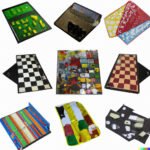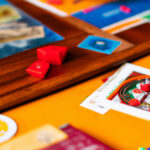The allure of classic board games has stood the test of time, captivating generations with their timeless charm and endless entertainment. From the strategic maneuvers of chess to the exhilarating roll of the dice in Monopoly, these beloved games have become a staple in households around the world. As we delve into the world of classic board games, we will explore their rich history, iconic gameplay, and enduring appeal.
Throughout history, classic board games have been a source of joy and friendly rivalry for people of all ages. Their origins can be traced back to ancient civilizations, with some games evolving over centuries to become the beloved pastimes we know today. From traditional favorites like Scrabble and Clue to lesser-known gems like the 4 letter word game, each game holds a unique place in our cultural heritage.
In this article, we will take a closer look at the most iconic classic board games that have stood the test of time. We’ll also dive into the rules and mechanics of these timeless games, exploring how they continue to bring people together for hours of fun and mental stimulation.
Whether you’re a seasoned player or new to the world of classic board games, there’s something undeniably special about gathering around a game board and immersing yourself in an evening of competitive play.
History
The history of classic board games is rich and spans centuries, with many games evolving over time to become the iconic pastimes we know today. The earliest known board game is believed to be the ancient Egyptian game of Senet, dating back to around 3100 BC. This early game set the stage for the development of board games as a form of entertainment and strategic play.
As civilization advanced, so did the complexity and diversity of board games. The invention of chess in India during the Gupta Empire in the 6th century is a testament to this progression. Chess quickly spread throughout Asia and Europe, becoming one of the most enduring and iconic classic board games in history.
During the 20th century, classic board games such as Monopoly, Scrabble, and Clue gained immense popularity and became household names. These games not only provided entertainment but also offered a reflection of societal values and economic principles. The continuous evolution of classic board games demonstrates their adaptability and resilience in captivating audiences across different generations.
| Classic Board Game | Origin |
|---|---|
| Senet | Ancient Egypt (3100 BC) |
| Chess | India (6th century) |
| Monopoly | United States (1935) |
Top Picks
Classic board games have stood the test of time, providing countless hours of entertainment and fun for people of all ages. From Monopoly to Scrabble, these iconic games have become household names and continue to be enjoyed by generations. Here are some top picks that have become synonymous with classic board game enjoyment:
1. Monopoly: This classic game of property and finance has been a staple in households since its creation in 1935. With its iconic board featuring properties like Park Place and Boardwalk, players compete to become the wealthiest tycoon by buying, selling, and trading properties.
2. Scrabble: A word game that has challenged the minds of players since 1938, Scrabble is all about creating words from letter tiles and scoring points based on the letters used. It’s a game that combines vocabulary skills with strategic placement to outscore opponents.
3. Clue: Also known as Cluedo in other parts of the world, this murder-mystery game requires players to use deductive reasoning to solve a crime by figuring out the murderer, weapon, and location. The suspenseful gameplay and element of mystery make it a timeless classic.
Classic board games such as these provide more than just entertainment – they offer an opportunity for social interaction, cognitive development, and strategic thinking. Whether played with family or friends, these games create lasting memories while promoting valuable skills such as critical thinking and decision making. As technology continues to advance, it’s reassuring to know that these classic games remain relevant and enjoyable in today’s digital age.
Gameplay
The 4 Letter Word Game has been a beloved classic board game for decades, known for its simple yet challenging gameplay that appeals to players of all ages. In this section, we will delve into the rules and mechanics of the 4 Letter Word Game, highlighting what makes it an enduring favorite among board game enthusiasts.
Objective
The primary objective of the 4 Letter Word Game is to create as many four-letter words as possible within a specified time limit. Players take turns drawing letter tiles from a pool and using them to form words, with points awarded based on the length and complexity of the words created.
Gameplay Mechanics
At the start of the game, each player draws a set number of letter tiles from the pool, typically around 5-7 tiles depending on the version being played. The round begins with one player setting a timer and all players simultaneously working to create words using their letter tiles. Once time is up, players compare their words and earn points based on predetermined scoring criteria.
Variations
There are numerous variations of the 4 Letter Word Game that add different layers of complexity and strategy to the gameplay. Some versions may include additional rules such as bonus points for specific types of words (e.g. compound words, palindromes) or restrictions on using certain letters. Additionally, some adaptations may incorporate themed word categories or special power-up tiles to enhance the gameplay experience.
Benefits
Playing classic board games offers a plethora of cognitive and social benefits that go beyond just entertainment. Whether it’s sharpening our critical thinking skills or fostering bonds with friends and family, these games have lasting positive effects on our well-being. Here are some of the key advantages of indulging in classic board game play:
- Enhances critical thinking and problem-solving skills
- Promotes strategic planning and decision-making abilities
- Encourages healthy competition and sportsmanship
- Fosters communication and cooperation among players
- Provides an opportunity for social interaction and bonding
Moreover, research has shown that engaging in regular board game sessions can have a significant impact on various aspects of cognitive function, especially in children and older adults. The mental stimulation involved in gameplay can help improve memory, concentration, and overall brain function, making it a beneficial activity for individuals of all ages.
In addition to the cognitive benefits, playing classic board games also offers an avenue for socialization and connection. Whether it’s a family game night or gathering with friends for a game of Scrabble or Clue, these activities create opportunities for meaningful interactions, laughter, and shared experiences that contribute to overall well-being. As we navigate through the digital age, the value of face-to-face social engagement that classic board games provide becomes increasingly significant.
Nostalgia
Connecting Generations
Classic board games have a unique ability to bring people from different generations together. Whether it’s grandparents teaching their grandchildren how to play chess or parents reminiscing about their favorite childhood games, these timeless classics create opportunities for intergenerational bonding. The shared experiences and memories associated with playing these games can bridge the generation gap and create lasting connections between family members.
Nostalgic Reminiscing
For many individuals, classic board games evoke a sense of nostalgia, transporting them back to simpler times when gathering around a game board was a common form of entertainment. The act of setting up the game pieces, rolling the dice, and strategizing moves can rekindle fond memories of childhood playtime. The familiar sights, sounds, and even smells associated with these games can trigger a wave of nostalgia, prompting players to reminisce about cherished moments spent with loved ones.
Sentimental Value
Classic board games often hold sentimental value for individuals due to the memories attached to them. Whether it’s receiving a particular game as a gift on a special occasion or playing it during holiday gatherings, these games become infused with personal significance.
As a result, they are often treasured possessions that hold emotional meaning beyond their gameplay mechanics. The sentimental value of classic board games adds an extra layer of enjoyment and attachment for players who appreciate the nostalgic sentiment behind each game.
Modern Adaptations
The digital age has brought about significant changes in the way we interact with traditional forms of entertainment, including classic board games. With the rise of technology, many classic board games have been reimagined for the digital age, allowing players to enjoy their favorite titles in new and innovative ways. From online versions of Monopoly to mobile adaptations of Scrabble, classic board games are finding new life in the digital realm.
One of the most notable modern adaptations is the 4 Letter Word Game, which has seen a resurgence in popularity through digital platforms. This word-based game has found success as a mobile app, allowing players to engage with the game on-the-go. By leveraging the convenience and accessibility of mobile devices, the 4 Letter Word Game has gained a new generation of fans while also appealing to existing enthusiasts who appreciate the updated gameplay experience.
Additionally, modern adaptations of classic board games have also expanded their reach through online multiplayer functions. Players can now connect with friends and strangers alike from across the globe to participate in virtual matches of their favorite board games. This shift towards online play has not only broadened the audience for classic board games but has also fostered a sense of community among players who share a passion for these timeless titles.
| Classic Board Game | Digital Adaptation |
|---|---|
| Monopoly | Online versions and mobile apps |
| Scrabble | Mobile adaptations and online multiplayer platforms |
| 4 Letter Word Game | Mobile app version with enhanced features and accessibility |
Conclusion
In conclusion, classic board games have certainly stood the test of time, captivating multiple generations with their timeless appeal. From ancient origins to modern adaptations, these games have evolved and adapted to meet the changing preferences of players. Whether it’s the strategic gameplay of Chess, the economic challenges of Monopoly, or the wordplay in Scrabble, classic board games offer a wide variety of experiences that continue to engage and entertain people of all ages.
The enduring legacy of classic board games can be attributed to their ability to bring people together for social interaction and fun. In today’s digital age, where technology often dominates our leisure activities, classic board games serve as a refreshing reminder of the joy and connection that comes from face-to-face interaction. These games not only provide entertainment but also offer cognitive benefits such as problem-solving skills, critical thinking, and language development.
As we continue to embrace modern advancements, it is important to recognize and appreciate the sentimental value and memories associated with these classic board games. Whether it’s reminiscing about childhood game nights with family or introducing these timeless favorites to a new generation, the enduring legacy of classic board games will undoubtedly continue to enrich our lives for many years to come.
Frequently Asked Questions
What Is the 4 Letter Word Card Game?
The 4 Letter Word Card Game is a word game where players try to form as many words as possible using just four letters. It’s a fast-paced and challenging game that tests players’ vocabulary and quick-thinking skills as they race against each other to come up with words within the time limit.
What Are Popular Board Games?
Some popular board games include classics like Monopoly, Scrabble, and Clue, as well as newer games like Settlers of Catan, Ticket to Ride, and Codenames. These games offer a variety of gameplay experiences, from strategic thinking to luck-based mechanics, making them enjoyable for a wide range of players.
What Is a Popular Crossword Puzzle Like Board Game?
A popular crossword puzzle-like board game is Bananagrams. In this game, players race against each other to create their own crossword grids using letter tiles. It combines the challenge of word formation with the speed of competition, making it an engaging and fun option for puzzle lovers.

I love playing all kinds of games – from classics like Monopoly to modern favourites like Ticket to Ride.
I created this blog as a way to share my love of board games with others, and provide information on the latest releases and news in the industry.





